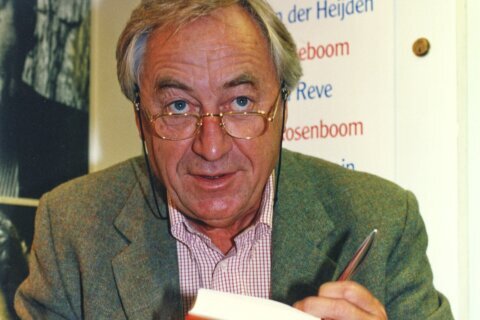WASHINGTON — Few filmmakers know how to make a thriller better than Tony Gilroy.
After penning the “Bourne” trilogy and directing “Michael Clayton,” Gilroy returns to the genre with “Beirut,” directed by Brad Anderson and starring Jon Hamm and Rosamund Pike.
“There’s no shortage of thrillers on television; getting one on the screen and getting people to leave their house to go see it is the trick,” Gilroy told WTOP. “It’s getting harder and harder. … They have to be done at a price. I bet there were several movies at Sundance that cost way more than this did. I can’t tell you what it cost, but you would be shocked how inexpensive this was made. I think if people can pull off little miracles like this, they have a chance.”
The movie follows U.S. diplomat Mason Skiles (Jon Hamm), who lives a happy life of luxury with his Lebanese wife in Beirut — until a terrorist attack suddenly wrecks his entire world.
“It’s paradise lost for him,” Gilroy said. “You meet him in ’72, he’s a mediator diplomat in Beirut, he’s married a Lebanese woman, he’s sponsoring a 12-year-old Palestinian boy for an education in America, he speaks fluid Arabic, he’s going to make his life here, he loves the Middle East, he loves his future. Then, in one night, everything is taken away from him.”
Ten years latter, he’s a broken-down boozer negotiating blue-collar labor disputes in Boston.
“I love that sequence,” Gilroy said. “It does a bunch of things. It shows you that negotiation is negotiation and people not getting along. It doesn’t matter if you’re arguing over a 2,000-year-old [diplomatic] disagreement or arguing over insurance premiums on a union contract, people fight. And if people would just shut up and listen and talk, there’s a way out of it.”
Suddenly, the past comes knocking as the CIA recruits him back to Beirut to negotiate a hostage situation involving an old friend, forcing him to return to the very site of his torment.
“When he returns, it’s the kind of thing you dream of when you’re trying to write,” Gilroy said. “The place he’s returning to is as ruined as he is. … That makes for good storytelling.”
It helps when you have two powerhouse actors channeling that story.
“He’s perfect for it,” Gilroy said of Hamm, before hailing Pike. “Rosamund has some steel.”
He said actors can make or break a scene. In fact, Gilory wasn’t sure about certain scenes on the page until he saw the actors read the lines. One such scene occurs when Hamm’s character first returns to Beirut, flippantly joking, “Where’s Cal? I half expected Cal to be here,” only for a CIA agent to yank the rug out and respond, “He’s the one who’s been kidnapped.”
“That scene is on the border to me of being unnatural,” Gilroy said. “It’s such a great turn that you have to find a way to do it. … It works because it’s delivered well. I warned Brad and said, ‘Please don’t lean on this.’ A lot of time you tell an actor, ‘Take the line out of it. If I hear me when you say this, we’re going to change it. Make it so I can’t hear me anymore.'”
He feels the same about a pivotal scene involving a code-speak clue leading to the P.L.O.
“To geek out screenwriting wise, that scene comes close to not working on the page,” Gilroy said. “That’s another scene that I really went over with Brad and said, ‘Man, if I was directing this scene I would be really nervous on that day.’ … That scene works so much better live than it does on the page. … [It] exceeded what I ever thought. I was like, ‘Wow! They crushed it.'”
Another pro tip for screenwriters: conflict will help you bury important exposition.
“The best way to get plot out in a movie is people that do not [get along],” Gilroy said. “I don’t know how you write a movie where people get along. The worse people don’t get along, the more contentious they are, the more they disagree, the more different opinions there are, and the more people dislike each other in the room, the easier it is to get plot out.”
Ironically, it took decades to get this plot out and onto the screen.
“I wrote this in 1991 and it was a big deal for me, my first real serious movie [but] we couldn’t get it made,” Gilroy said. “The politics were considered too inflammatory. … Twenty years went by, it disappeared, I never thought about it, and these producers [at] Interscope pulled it out of a drawer and said, ‘We really like it. It’s actually sexier now that time has passed.'”
A lot has changed in those 27 years. Gilroy has directed “Michael Clayton,” his younger brother Dan directed “Nightcrawler” and Dan’s fraternal twin John is “one of the best editors on the planet.” The trio was raised by Pulitzer Prize-winning playwright Frank Gilroy.
“My father was a great father,” Gilroy said. “He was an only child and was extremely into fraternity and the fact that we get along. … We grew up in upstate New York and went to public high school in a very unusual place where Michael Clayton grew up. Our school was a real mess, not a great education. … We had this secret big life in the middle of a really rough-and-tumble community. The only way to fit in was to be part of that rowdy community.”
This free-range childhood ultimately helped the Brothers Gilroy in the long run.
“From 2:00 in the afternoon until dinner, no one ever knew what we did,” Gilroy said. “We lived in the woods with guns, bikes, minibikes, drugs. It was mad and rugged. … There was a toughness about it, yet at the same time we knew we had this secret where in the summer we’d go to Europe and Broadway and had this intellectual life. … That grit really came in handy as we became journalists, bartenders and musicians and figured our way through this.”
Listen to the full conversation with Tony Gilroy below:








